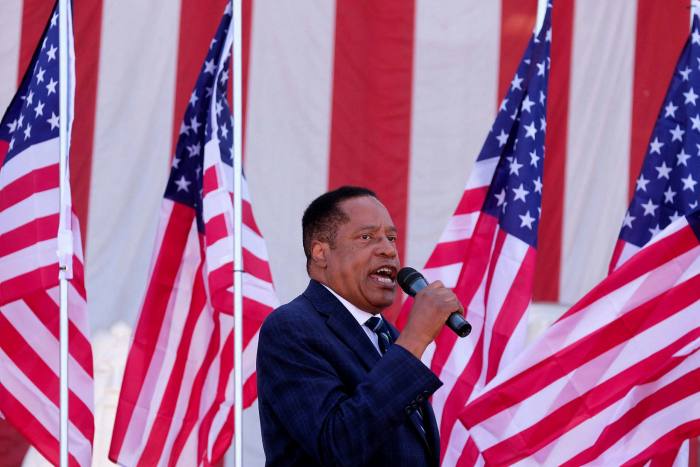California governor Gavin Newsom’s chances of remaining in office have improved ahead of Tuesday’s recall election, with a surge of Democrats casting early ballots and polls showing most voters opposing the effort to remove him from office.
Newsom will get another boost on Monday when President Joe Biden appears by his side at an event in Long Beach, demonstrating the importance to the White House that the largest US state remains in Democratic control. Vice-president Kamala Harris and Senator Elizabeth Warren have also campaigned for him.
The vote on Tuesday will cap an unusual election pitting a wealthy, ambitious first-term governor against 46 challengers — a varied group including Republican politicians, a YouTube star, a reality show personality, a billboard model and a handful of law enforcement officers. It has cost the state more than $275m, and even if Newsom prevails he will face re-election next year.
Recent polls show Newsom gaining momentum, with about 60 per cent of likely voters saying they oppose his removal from office, an improvement from 50 per cent in July. He was dogged for most of the summer by concerns about an “enthusiasm gap” that might diminish the turnout among Democrats, who outnumber Republicans in the state by a margin of two to one.
A strong get-out-the-vote effort by public sector unions and community groups in recent weeks has helped close the gap. Steve Philips, co-founder of political organising group PowerPAC+, said Newsom’s turnround was down to outreach efforts targeting Latinos, Asian-Americans and other people of colour in recent weeks.
“The risk was that people weren’t going to pay attention and turn out,” he said. “I feel better than I did six weeks ago” about Newsom’s chances.

But the emergence of Larry Elder as the frontrunner to replace Newsom appears to have given the governor’s campaign the clarity it needed. Elder, a conservative radio “shock jock,” opposes abortion rights, favours the elimination of the minimum wage and is against mask and vaccine mandates.
Newsom said last week that Elder, a Republican, “is someone who celebrates” Texas’s recent restrictions on abortion, a motivating issue among California Democrats. According to the Berkeley IGS Poll, 65 per cent of voters said electing a Republican governor would “threaten” the state’s policies on issues such as climate change, immigration, healthcare and abortion.
Newsom has been playing into fears among Democrats that a recall could imperil their narrow control of the US Senate. Elder has pledged to do just that, saying he would appoint a Republican replacement for Democratic Senator Dianne Feinstein, 88, if she were unable to complete her term.
“They’re afraid I’m going to replace her with a Republican, which I most certainly would do and that would be an earthquake in Washington, DC,” Elder said in a recent radio interview.
Such issues have animated the Democratic base in the state even as Newsom and California face a range of problems, including droughts, wildfires, homelessness and the continuing effects of Covid-19. Newsom may have helped himself on the latter issue at the end of August when the state began issuing new $600 stimulus cheques to residents who earned less than $75,000 a year.
Elected in 2018 by a landslide margin of 62 per cent against Republican businessman John Cox — who is also on the recall ballot — Newsom positioned himself as a leader of the anti-Trump “resistance”. His standing in the state was strong a year ago, when he enjoyed an approval rating of 64 per cent. But since then many have been frustrated by the state’s Covid restrictions.
Republicans began seeking to recall Newsom almost immediately after he took office. They succeeded in raising enough signatures for a recall on their sixth try, marking the second time in California history that a governor has faced a recall election. Democrat Gray Davis lost a recall vote in 2003 to actor Arnold Schwarzenegger, who himself faced seven recall attempts during his two terms in office.
Despite the improving poll numbers, risks remain for Newsom. The California ballot requires Newsom to defeat the recall measure by a majority, but if he fails then the candidate with the most votes will serve out the rest of his term. This means his potential successor could defeat him with a far smaller share of support.
If he prevails, Democrats are expected to launch an effort to reform California’s 110-year-old recall system.

